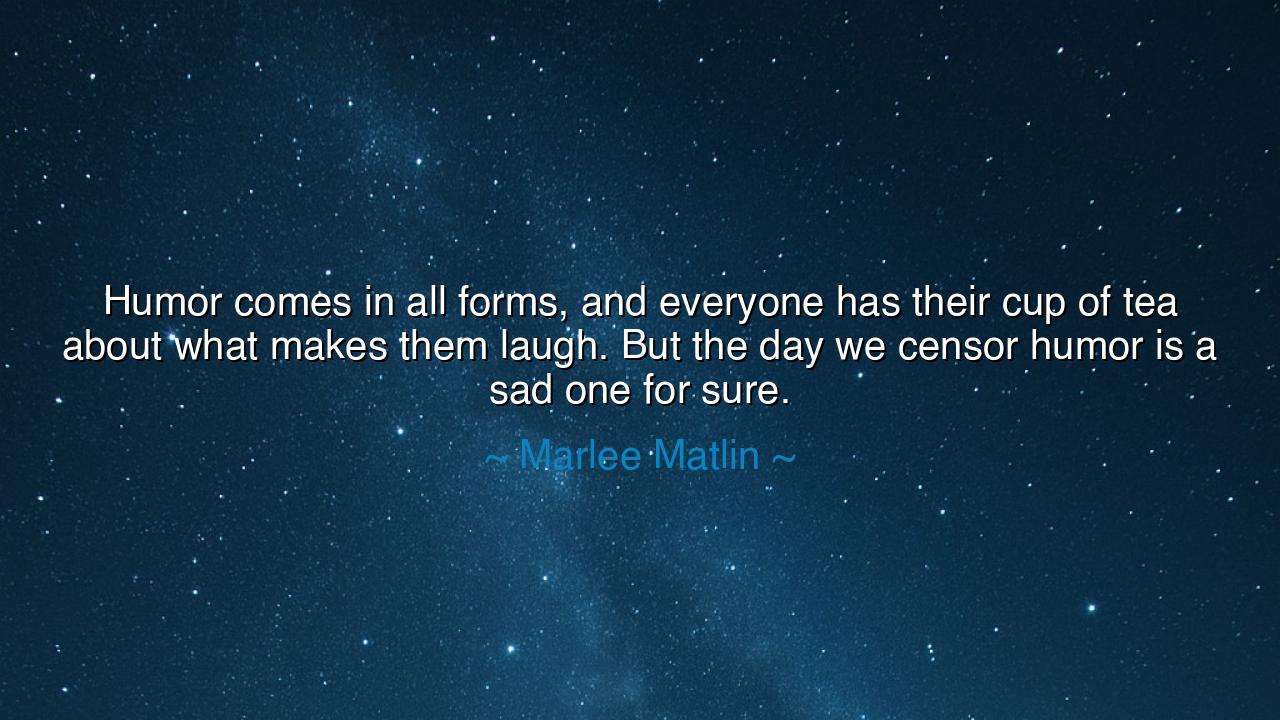
Humor comes in all forms, and everyone has their cup of tea about
Humor comes in all forms, and everyone has their cup of tea about what makes them laugh. But the day we censor humor is a sad one for sure.






Hear now the words of Marlee Matlin, a woman of grace and strength, who said: “Humor comes in all forms, and everyone has their cup of tea about what makes them laugh. But the day we censor humor is a sad one for sure.” Though spoken in the gentle cadence of modern speech, these words bear the timeless weight of wisdom. For they remind us that humor—the laughter that lightens the soul—is a sacred freedom of the human spirit, as vital as breath and as ancient as fire. It is the spark that defies despair, the voice that rebels against silence. To censor humor, to silence laughter, is to wound the very heart of humanity.
The ancients knew that humor was a divine gift. In the courts of kings and the markets of the common, the jester and the satirist were not fools but philosophers in disguise. They spoke truth through laughter, turning mockery into revelation. The laughter they inspired was not mere amusement—it was release, reflection, and revolt. Aristophanes, the great Greek playwright, used comedy to question power, hypocrisy, and war. His plays dared to make light of sacred things, not to insult them, but to remind the people that no authority—divine or human—should stand beyond the reach of laughter. Thus, humor, in all its forms, has ever been the voice of freedom, the laughter of the unbroken.
Yet Marlee Matlin warns us that when laughter is chained, the human soul grows dim. To censor humor is not merely to forbid a jest—it is to forbid questioning, to silence irony, to stifle reflection. For laughter is truth disguised as joy. The tyrant fears it because it strips away pretense. The fanatic rejects it because it makes him see his own absurdity. But the wise embrace it, knowing that laughter humbles and heals. A society that cannot laugh at itself is a society already enslaved to fear.
Consider the story of Voltaire, that great voice of the Enlightenment. Through satire, he unmasked the arrogance of kings, the cruelty of dogma, and the folly of superstition. His laughter was sharp, his pen relentless. He was exiled and censored, yet his wit outlived his persecutors. His laughter, though scorned in its day, helped to awaken a generation. So it has been throughout history: those who would silence humor often do so out of weakness, for they cannot bear to be seen as they truly are. The one who can laugh at himself, however, is free beyond measure.
Marlee Matlin, herself an artist who has triumphed over silence, speaks with the authority of one who knows the power of expression. She reminds us that humor comes in all forms—that it is as diverse as the souls who share it. What makes one laugh may not move another, and that is the beauty of it. Laughter is the sound of difference made harmless, of individuality made joyful. It is not meant to divide but to unite, to show that we can find light even in contradiction. The moment we begin to measure, control, or censor laughter, we begin to lose this shared humanity.
The origin of her warning lies in compassion. To defend humor is not to defend cruelty or ignorance—it is to defend the right to feel, to think, and to speak freely. The ancients believed that laughter was a form of purification, a cleansing of the soul through joy. In every culture, the festival, the carnival, and the feast were times when laughter broke barriers of class and creed. The farmer could laugh with the priest, the fool with the noble. In laughter, all were equals. To censor humor, then, is not only to silence speech—it is to divide the human family and to deny it its most sacred communion.
Let this be the lesson passed down to future generations: guard your laughter as you would guard your freedom. Do not let fear dictate what may be smiled at. Do not allow power, pride, or outrage to steal the joy that connects all hearts. Laugh kindly, but laugh boldly. Use humor not to wound, but to illuminate. When you encounter what you do not understand, let laughter soften your fear rather than harden your heart. For laughter that springs from love, from understanding, from wisdom—is a light that no darkness can extinguish.
Thus, remember the wisdom of Marlee Matlin: the day we censor humor is indeed a sad one, for it is the day we forget how to heal ourselves. Let laughter ring even in the halls of sorrow, for it is the proof that hope still breathes. Protect the jester, cherish the story, and honor the joke that speaks truth. For as long as laughter endures, humanity endures—and wherever humor lives, freedom yet survives.






AAdministratorAdministrator
Welcome, honored guests. Please leave a comment, we will respond soon